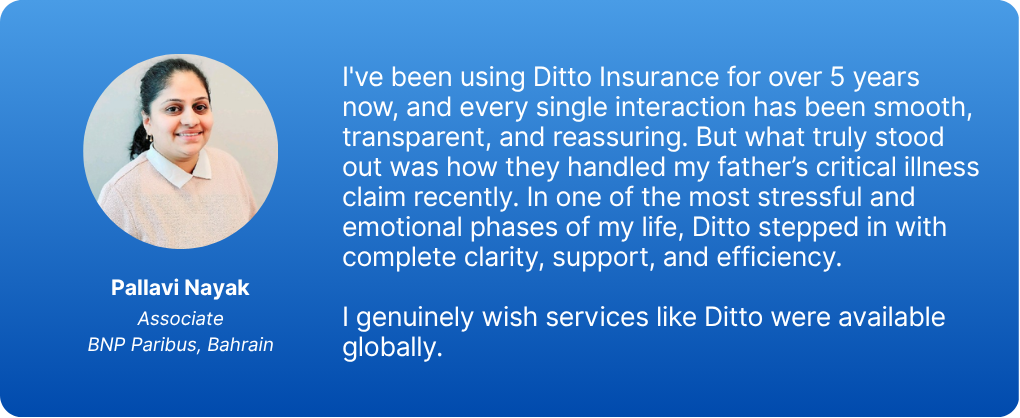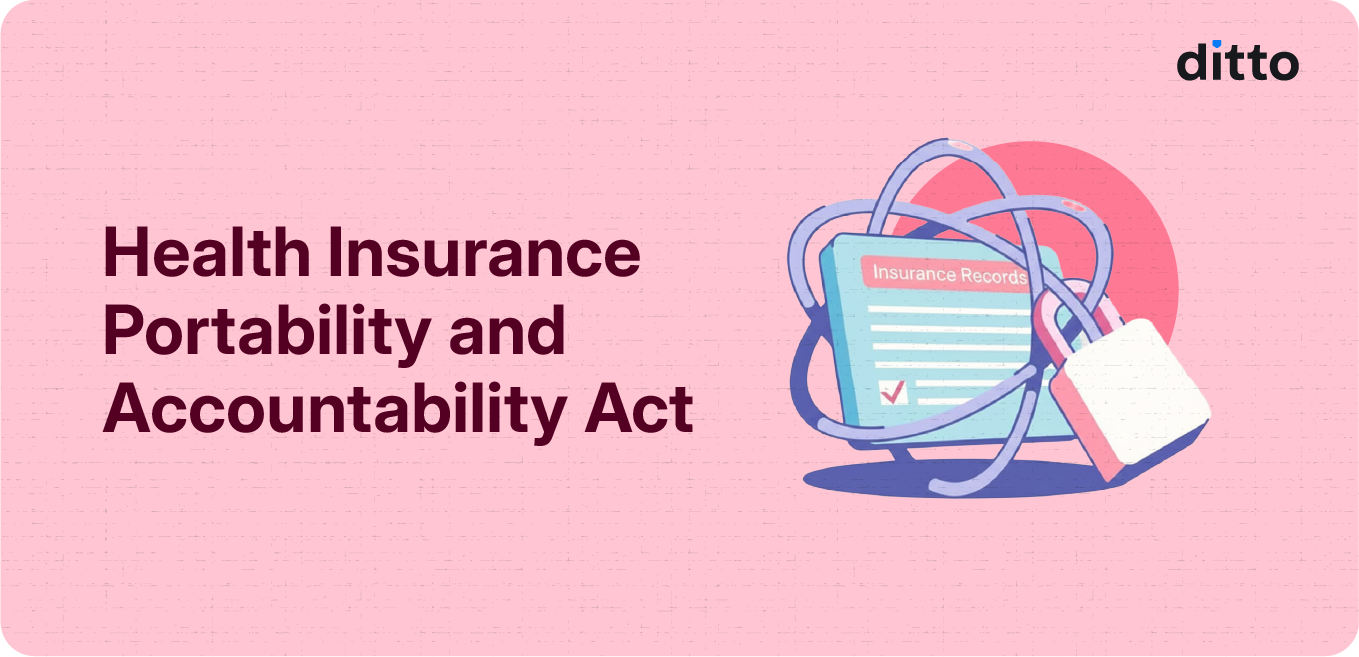Quick Overview
Keeping your personal health information secure is critical because it protects your privacy, and prevents identity theft and insurance fraud. This also ensures that your sensitive medical details are not misused or accessed without your consent. In the U.S., the Health Insurance Portability and Accountability Act of 1996 establishes strict guidelines for the storage and protection of personal medical data.
In India, the Insurance Regulatory and Development Authority of India (IRDAI) and the Digital Personal Data Protection Act, 2023 (DPDP) serve the same purpose as the HIPAA does along with a few other organizations. At Ditto, we help you better understand insurance regulations and data protection laws so you can choose the right policies.
In this guide, we will walk you through HIPAA guidelines and what qualifies as protected health information in both the U.S. and India.
About the Health Insurance Portability and Accountability Act
HIPAA is designed to protect the privacy of Protected Health Information(PHI), which refers to any personal details about your health, medical care, or payments that can identify you. Healthcare providers, insurers, or their partners usually handle this information, which is protected under U.S. laws, to ensure your privacy.
Under the Health Insurance Portability and Accountability Act, privacy, use, and disclosure have distinct meanings:
- Privacy Rules: Ensure patients give written consent before their personal health information is used or shared.
- Use: Refers to how healthcare staff handle and apply patient information within their organization.
- Disclosure: Involves sharing patient information with individuals or organizations outside the healthcare facility.
Does India Have Any Laws Like HIPAA?
India does not have HIPAA laws; instead, it governs health data through a combination of the following laws and guidelines:
Key Indian Laws
Note: The IRDAI ensures that insurance companies in India handle policyholder information securely. Additionally, the DPDP Act regulates the collection, storage, and use of personal data. Together, both entities create a robust framework to protect sensitive health and financial information, much like the Health Insurance Portability and Accountability Act does in the U.S.
What Are the 5 Main Components of HIPAA?
- Title I (Health Care Access, Portability & Renewability): Protects your insurance coverage when you change jobs or have pre‐existing conditions.
- Title II (Preventing Health Care Fraud and Abuse, Administrative Simplification, and Medical Liability Reform): Introduces the Privacy Rule, Security Rule, national identifiers, and standards for electronic data.
- Title III (Tax-Related Health Provisions): Focuses on tax treatment of health insurance and medical expenses.
- Title IV (Application & Enforcement of Group Health Plan Requirements): Addresses rules for group health plans and policy structures.
- Title V (Revenue Offsets): Miscellaneous provisions, including employee benefits and company-owned life insurance rules.
Under the Health Insurance Portability and Accountability Act, PHI is linked based on a list of 18 identifiers that must be treated with special care. The act establishes standards to protect patient health information and guide healthcare practices. This brings us to an important question:

What is the Purpose of HIPAA?
Protecting Patient Privacy
Ensure confidentiality of health information and empower patients to control its disclosure.
Securing Health Data
Mandate safeguards for the transmission, storage, and access of protected health information to prevent unauthorized use.
Standardizing Compliance
Guide healthcare providers, insurers, and related organizations in implementing consistent privacy and security practices.
Supporting Legal and Ethical Responsibilities
Educate healthcare professionals on their data protection and breach management obligations.
Promoting Trust in Healthcare
Strengthen patient confidence through reliable data handling and adherence to regulatory requirements.
Permitted Uses and Disclosures in the Health Insurance Portability and Accountability Act
HIPAA allows healthcare providers and insurers to use or share PHI without a patient’s written consent in specific cases. Here’s when PHI can be used or disclosed:
- To the Individual: When patients request access to their records or a record of disclosures.
- For Treatment, Payment, and Healthcare Operations: To coordinate care, process claims, or manage healthcare services.
- With a Patient Opportunity to Agree or Object: When informal permission is given verbally or through clear circumstances.
- As a Limited Dataset: For research, public health, or healthcare operations.
- For Public Interest or National Priorities: This includes law enforcement, government oversight, or public health reporting.
Does HIPAA Apply to Telehealth and Digital Health?
The Health Insurance Portability and Accountability Act applies strictly to telehealth, covering all electronic information exchanges such as video calls, online chats, and remote health monitoring. Healthcare providers must use secure platforms with encryption, strong authentication, and confidentiality agreements to protect sensitive data.
During telehealth sessions, doctors should connect with their patients from private spaces, such as clinics or offices, and patients are encouraged to join from a private setting, whether at home or elsewhere.
If complete privacy is not possible, simple steps, such as lowering your voice or avoiding speakerphones, can help keep personal health information secure.
Even during emergencies, when some HIPAA rules may be temporarily relaxed to support healthcare delivery, privacy and data protection remain top priorities. These safeguards help ensure that virtual care is safe and compliant, maintaining patient trust in digital healthcare.
Why Choose Ditto for Health Insurance?
At Ditto, we’ve assisted over 8,00,000 customers with choosing the right insurance policy. Why customers like Pallavi below love us:

- No-Spam & No Salesmen
- Rated 4.9/5 on Google Reviews by 15,000+ happy customers
- Backed by Zerodha
- Dedicated Claim Support Team
- 100% Free Consultation
Confused about the right insurance? Speak to Ditto’s certified advisors for free, unbiased guidance. Book your call or chat on WhatsApp with us now!
Health Insurance Portability and Accountability Act of 1996 (Ditto’s Take)
Since HIPAA is not applicable in India, the country is now building a similar framework through the DPDP Act, ABDM, and IRDAI guidelines. Once the DPDP Rules are enforced and the Data Protection Board is operational, healthcare entities will adhere to HIPAA-like privacy standards tailored for India's digital health future.
Disclaimer
Frequently Asked Questions
Last updated on:










